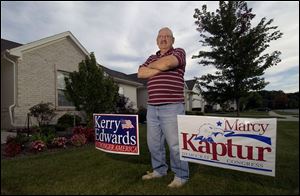
Political signs place couple at odds with deed covenant
10/7/2004
Sylvester Wcislak refuses to remove political signs from his villa, despite a warning from the property manager to do so.
Geneva and Sylvester Wcislak don't think it's fair that they have to take down two political campaign signs they posted in the front yard of their villa at Wingate Village in Springfield Township.
While recent court decisions have tended to provide greater guarantees for free speech when it comes to political signs on private property, legal experts say some residential property owners such as the Wcislaks may be standing on shakier legal ground if they have signed restrictive covenants when purchasing their properties. Such covenants, the experts say, are more likely to be viewed by courts as contractual issues rather than Constitutional issues.
The retired couple say they have learned that the hard way. They claim they were notified Friday by their property manager, Roger Rife of Gerdenich Realty Co., to remove their signs - one for Democratic presidential and vice presidential candidates John Kerry and John Edwards and the other for Congressman Marcy Kaptur - or he would do it himself.
"I don't think it's offensive to anyone. It's an election year," Mrs. Wcislak said.
Mr. Rife, who did not return calls for comment, had as of yesterday not carried out his threat.
The issue goes beyond court decisions such as a 2000 Ohio Supreme Court ruling that sided with the right to free speech over municipal codes regulating the placement of political signs on private property and how long they can be up.
Mr. and Mrs. Wcislak are bound by a deed restriction that is attached to the legal contract on her villa property, which is part of a Planned Urban Development project. Those restrictions prohibit any yard signs other than "for sale" signs from being posted in the front yard.
"To change this, it takes [a vote of] a two-thirds majority of the homeowners in the complex. We did receive some complaints from residents," said Dan Cox, husband of Linda Cox, the president of the Wingate Village homeowners' association. "Nobody else has done this since we moved in, and we were the second to move in."
Attorney Clay Calvert, co-director of the Pennsylvania Center for the First Amendment and professor of communications and law at Pennsylvania State University, said the deed restriction does not bode well for the Wcislaks' argument that this is a Constitutional issue.
"It would be my belief that the contractual obligation would probably control in that situation," Mr. Calvert said.
The attorney compared the situation to painting a message on a home or painting a home a certain color in a planned community where deed or covenant restrictions prohibit that activity. Larry Otter, a Pennsylvania attorney who has represented land owners in over 50 court cases relating to political signs and free speech issues, agreed that case law in the U.S. "tends to favor these restrictive covenants."
"It's not as clear as if a municipality was doing it," he said.
Some communities prohibit political signs on private property or set time limits on when such signs are permitted.
Mr. Otter said how the courts would rule on such a matter is "a coin flip at this point."
He said he believes most courts would be reluctant on a public policy basis to enforce such contracts, or any fines related to them.
"These agreements totally disregard traditional American values, one of which is speaking up about elections," he said.
Contact Tad Vezner at:
tvezner@theblade.com
or 419-724-6050.